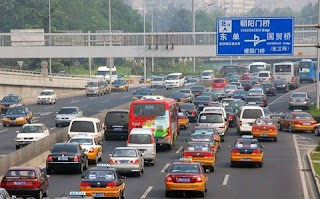
Rumors that Beijing was going to introduce a cap on car registration or sales have been quashed with an announcement on Wednesday that the city government would do no such thing.
The deputy head and spokesman of the commission justified the decision not to impose a limit on the grounds of a need to maintain the long-term development of the country's auto industry and sustain general economic growth.
Once again the environment is coming second when this country just think about economic growth. So typical todays China - just think about today and forget about "tomorrow" because YOU will not be there....
Rumors of an imminent introduction of some kind of limit on car sales or registration led to a spike in car sales as Beijingers attempted to beat the introduction of the new regulations. So when the rest of China's auto industry was witnessing a drop of sales up to 30% across the country, the Beijing market remained strong.
Reactions to the announcement are mixed, with many drivers already frustrated by the complex rules of the new car regulation along with automakers and potential car buyers seem relieved that the government has not decided to meddle any further.
However, other residents who have enjoyed the benefits of the Olympic odd-even ban - according to reports it helped to eliminate 120,000 tons of pollutants (about 63 percent of total vehicular pollutant emissions) and has given Beijing the best air quality results it has experienced in 8 years - not to mention less congested roads - think that the government has sacrificed the quality of life of Beijingers for the good of the economy.
Once again the environment is coming second when this country just think about economic growth. So typical todays China - just think about today and forget about "tomorrow" because YOU will not be there....
Rumors of an imminent introduction of some kind of limit on car sales or registration led to a spike in car sales as Beijingers attempted to beat the introduction of the new regulations. So when the rest of China's auto industry was witnessing a drop of sales up to 30% across the country, the Beijing market remained strong.
Reactions to the announcement are mixed, with many drivers already frustrated by the complex rules of the new car regulation along with automakers and potential car buyers seem relieved that the government has not decided to meddle any further.
However, other residents who have enjoyed the benefits of the Olympic odd-even ban - according to reports it helped to eliminate 120,000 tons of pollutants (about 63 percent of total vehicular pollutant emissions) and has given Beijing the best air quality results it has experienced in 8 years - not to mention less congested roads - think that the government has sacrificed the quality of life of Beijingers for the good of the economy.

Many residents are not convinced that the city's decision to forgo a limit on car numbers and instead to focus on
- expanding the public transport system
- raising parking fees in downtown Beijing
- offering free bike hire
and doing away with fuel sudsidies will be enought.
At present there are close to 3.4 million cars clogging Beijing's streets and approximately 1,200 new vehicles appear on the road everyday.
It's estimated that this number will soon reach 4 million.

